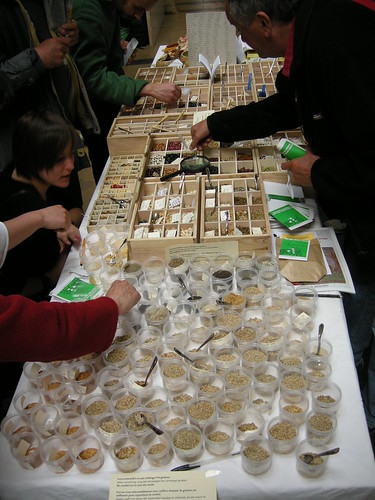I read a lot of blogs, scattered throughout the world. People grow vegetables and save seeds in every corner of the earth. This can be a solitary occupation and blogs connect us and keep the passion alive. Amazingly, seed saving has become very political in some parts of the world, with multinational seed companies forcing small seed companies not only out of business, but, in the EU, trying to make it almost impossible to share heritage seeds!! Read more details on the website Seed Sovereignty.
And read 2 of my favourite European seed saving blogs.... Patrick's Bifurcated Carrots and Søren's In The Toad's Garden. Thanks for the photos, fellas! 
Seed saving and swapping, not selling, is still allowed, however and I have just read of an enormous gathering that recently took place in Belgium, bringing together people from all over Europe, to a seed savers gathering. Wow.... imagine meeting up with thousands of like-minded people, all speaking different languages, but coming together to share seeds of their favourite vegetables.
In Australia we are free to sell /share our own seeds, adapted to our own climates but, on the whole, people find it more appealing to buy a few seeds in a pretty packet, from an unknown climate or country, more often than not repackaged from a multi national seed company! Yes, this applies to ALL seed companies you may be buying from, even from what you think is a small seed company selling their own saved seed. Yes, it is a good idea to buy from small, local seed companies but ask them where the seed is saved before you buy too much. They save what they can, themselves, but buy in more than half from overseas.
I struggle to get a few people to come to our seed swap days, where we share seeds we have saved in our own gardens. Pretty packets have more allure, especially those with foreign words on them. Sure, we can buy them once but then we should save them ourselves and get them adapted to our own soils and climates.
Seeds are the basis of life. Its all very well building an eco house, owning an eco car, turning off the tv, reading books on sustainable living, getting solar panels, eating organic food and shopping at second-hand shops but these are only the tips of the ice-bergs. Without seed biodiversity, humans, birds, insects..... all animal life, cannot exist. Without animal life, plant life cannot exist, and so the world slithers back to moulds and bacteria.
The reason for the demise of seed saving is simple: money cannot be made from gardeners and farmers saving their own seed. It is free. It needs no advertising, no equipment, no inputs at all..... nothing that can be commercialised.
If you want to do something that gets to the core of saving the planet, join up with others and save seeds.
6 comments:
Congratulations on a wonderful post with a clear and non-emotional argument. I am going to be so much more careful. Thanks.
You've made my day, Hazel. If I can improve just one person's understanding, then it makes this blog so worthwhile.
You're quite right that seed-saving is vital for preserving biodiversity, Kate. I think the reason people don't talk about it more here in southern France is that it is so widespread - literally, everybody does it without thinking about it and they have done it for generations - so it's taken for granted. All the gardeners here in the village save seed and share it, swap seed, give plants to other gardeners with the advice that it will be good seed to save when harvest comes....it is part of normal life here. I just wish it could spread out to the rest of the world!
I believe whote heartedly in sharing heritage seeds. Every so often I just give them away to fellow bloggers who email me. It seems criminal that I have spares in my seed tin when I would be sending them out to many people who would keep them going.
Losing the right to resow seeds from ones own harvest would be a terrible injustice. Thank you for sharing this post, let us hope that enough people stand up and refuse this type of legislation. Unfortunately, with so few people these days growing their own food it would seem that those who are concerned about these matters would be in the minority...let us hope that that is not the case.
Great post Kate!
Post a Comment